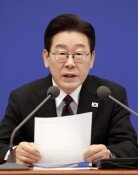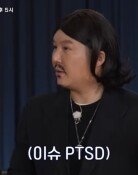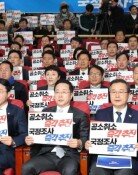Growing Possibility of FTA Renegotiations after Agreement
Growing Possibility of FTA Renegotiations after Agreement
Posted April. 13, 2007 07:58,
Wendy Cutler, the chief negotiator for the U.S. in the Korea-US FTA (KORUS FTA) talks, raised the possibility of a renegotiation of the KORUS FTA.
High-ranking officials of South Korea dismissed the possibility, saying There will be no renegotiations. But her remark caused a stir as it is hard to ignore.
The South Korean government sees her comment as a strategy to press South Korea to further open up its beef and automobile markets. And the government is keen to find out what the U.S. really wants.
Wendy Cutler, assistant U.S. Trade Representative for Japan, Korea and APEC Affairs and chief negotiator of the KORUS FTA negotiations, attended a forum hosted by the Heritage Foundation on April 11 (local time.) She said, There are ongoing discussions between the administration and Congress with respect to labor and possibly other provisions. Once the discussions are concluded, the U.S. and Korea will be in a position to figure out what is the best way for Korea to move forward.
Her comment seems to reflect the response of the U.S. Congress to the conclusion of the KORUS FTA. On March 27, the Democratic majority unveiled a New Trade Policy which requires countries to adopt, maintain and enforce basic international labor standards in their domestic laws and practices.
During the talks, U.S. representatives suggested Democrats could demand amendments in the labor area after the negotiation ends. But the final agreement didnt indicate such changes are possible.
Rep. Charles B. Rangel, a member of House Committee on Ways and Means, said on April 7, The key point of the talks are the beef and automotive sectors. If the final agreement is not satisfactory, Congress could demand changes in the provisions.
Korean governments position is, in principle, that there will be no negotiations.
Kwon O-kyu, deputy prime minister and minister of Finance and Economy, was present in the National Assembly Committee on Finance and Economy on April 12. He said, The KORUS FTA was concluded after negotiations over articles to balance each sides interest. To start renegotiations will be extremely difficult."
His remark means the government doesn`t have any plan to pursue renegotiations that will undermine the substance of the agreement, though there could be some changes in the wording.
Kim Seok-dong, Vice Minster of Finance and Economy on Policy and Coordination, also clearly stated at a regular press conference, The government could agree on some word changes, but we will not start any renegotiations or accept any proposals related to the amendment.
The government thinks there will be little possibility that the U.S. administration wants renegotiations over labor provisions.
Lee Sang-soo, Minister of Labor, said on that day, I doubt whether it is possible for the U.S. to change the provisions of the KORUS FTA as it has been concluded. And it will be virtually impossible for Korea to accept the demand.
Some analysts think her remark is a strategy to induce Korea to make a low-level agreement, to start renegotiations.
Lee Jun-kyu, Head of Center for American Economic Studies at the Korea Institute for International Economic Policy (KIEP), said, The U.S. Congress and several interest groups are not satisfied with some provisions. They are highly likely to insist on including additional provisions to the agreement, if they do not change existing provisions.
It is hard for the Bush administration to ignore what the U.S. Congress demands as it has final say over trade issues. Therefore, if Congress refuses to ratify the agreement, the KORUS FTA will be delayed until it finally goes into effect.
One government official said, We have several issues to discuss further, such as safety regulations on U.S. beef imports and setting visa quotas for professionals. The Korea Embassy in Washington is keeping a close watch on the activities of the U.S. Congress.
abc@donga.com







